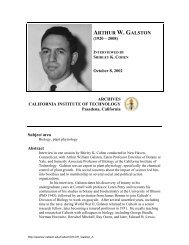Interview with David Baltimore - Caltech Oral Histories
Interview with David Baltimore - Caltech Oral Histories
Interview with David Baltimore - Caltech Oral Histories
Create successful ePaper yourself
Turn your PDF publications into a flip-book with our unique Google optimized e-Paper software.
<strong>Baltimore</strong>-57<br />
They made the only fraction collectors for chromatography in the world, and they were<br />
handmade machines—I can see it. Then, in the early fifties, I think, he came across technology<br />
that was developed by a guy in Cleveland, Leonard Skeggs, to measure the concentration of<br />
analytes and enzymes and things in blood in an automated fashion. Skeggs had done this<br />
because he was a physiologist and was tired of running samples by hand. He was interested in<br />
rabbit physiology. I think it was mostly coronary things; you measured coronary enzymes and<br />
whatever. He was tired of measuring them by hand and getting scattered data that were hard to<br />
interpret; he wanted something really precise. So he realized that you could put reagents into a<br />
system automatically by flowing them down a Teflon tube and separating the units of material by<br />
air bubbles, because an air bubble would effectively clear everything in its path in a Teflon tube.<br />
And that discovery—the discovery of the bubble—was what Jack licensed from Leonard Skeggs,<br />
who remained his friend throughout his life; Leonard was on the original board of the Whitehead<br />
Institute.<br />
So Jack turned that into a business, and by the time I met him, which is in 1980, he had<br />
built a business selling automated clinical-analysis equipment to the world. The Technicon<br />
AutoAnalyzer was the instrument used in every clinical lab in the world, and they had gone into<br />
computerization of it and really made it a multichannel big deal. These were selling for<br />
hundreds of thousands of dollars. So Jack was a very rich man, because he had developed this<br />
company, and when he took the company public, in 1970 or something, he suddenly found<br />
himself a paper billionaire.<br />
LIPPINCOTT: What do you mean by “paper”<br />
BALTIMORE: Well, because he owned most of the stock in the company—but it was stock, so if<br />
the stock went down, your wealth went down. But he had a lot of money. He hired a tax adviser<br />
to advise him about this. The tax adviser said, “You have a huge problem. If you die, the estate<br />
taxes will be so enormous that they will have to sell the company.” He said, “Wait a minute! I<br />
want to leave the company to my kids.” And the tax man said, “No, you can’t do that.” There<br />
was, however, a loophole, and the loophole had been opened by Howard Hughes and is the basis<br />
of the Howard Hughes Medical Institute. Which was that if you started an institute of medical<br />
research at a hospital, then you could have the institute own the company, control the company,

















